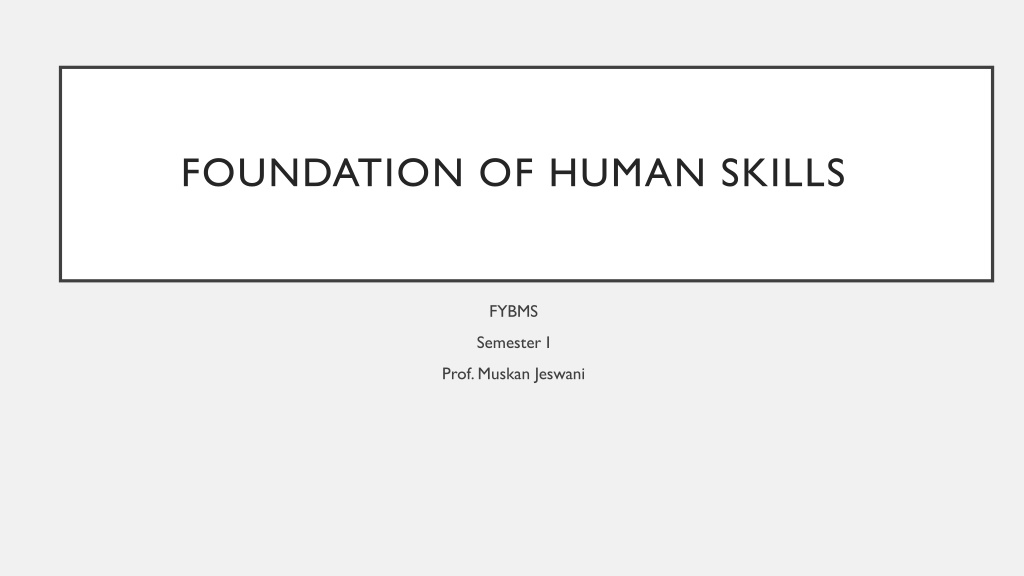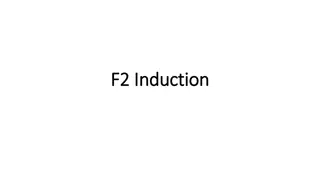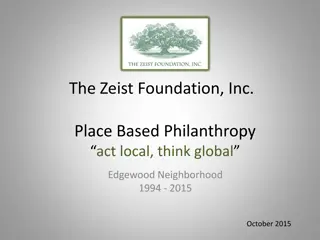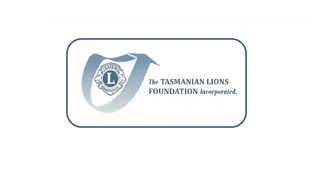Understanding Human Nature and Individual Differences in Foundation of Human Skills
Explore the foundational concepts of human behavior, individual differences, and organizational culture in the study of human skills. Delve into topics such as human nature, personality, attitudes, intelligence, and learning in Prof. Muskan Jeswani's course. Understand the significance of inter- and intra-individual differences, factors affecting individual differences, and how these aspects shape human interactions and behavior.
Download Presentation

Please find below an Image/Link to download the presentation.
The content on the website is provided AS IS for your information and personal use only. It may not be sold, licensed, or shared on other websites without obtaining consent from the author. Download presentation by click this link. If you encounter any issues during the download, it is possible that the publisher has removed the file from their server.
E N D
Presentation Transcript
FOUNDATION OF HUMAN SKILLS FYBMS Semester I Prof. Muskan Jeswani
SYLLABUS: Unit I: Understanding of Human Nature Unit II: Group Behaviour Unit III: Organization Culture Unit IV: Organizational change and creativity Prof.Muskan Jeswani
CHAPTER 1. INDIVIDUAL BEHAVIOUR Introduction of Human Nature Individual Differences Nature and Significance of Individual Difference Inter- and Intra-Individual Differences Factors Affecting Individual Difference Prof.Muskan Jeswani
INTRODUCTION TO HUMAN NATURE Human nature is a topic of general interest Man is a social animal He always lives in a Society Can he survive alone without the society, family, colleagues or friends? A person has to be depended on others for satisfying his needs to have the ability to get the work done. Human skill is the ability to work with, understand and motivate other people both individually and in groups , for e.g., through human skill, a manager can take maximum advantage from other materials of organization such as money, technology and raw material Study of human nature deals with personality, attitudes, intelligence, thinking, abilities, values, learning and perception. Prof.Muskan Jeswani
INDIVIDUAL DIFFERENCES All individuals are not equal. They all differ from each other not only in physical characteristics but also in behavioral characteristics. Individual differ from each other in qualitative as quantitative ways. The science that studies these qualitative and quantitative differences among people is known as the study of individual differences (also called as differential psychology). Meaning: Individual differences means differences between individuals which makes one a unique individual. Prof.Muskan Jeswani
Differences Lets understand this with an example Inter Individual Intra Individual Intra-individual differences refers to differences among various characteristics possessed by the same person. Different abilities are present in the same person, All differences among persons in their attitude, physical features, intelligence, personality, interest, learning etc. It refers to differences in a particular characteristics among various individuals Prof.Muskan Jeswani
INTER-INDIVIDUAL DIFFERENCES Each kid is very different from the other. 1. Personality 2. Attitude 3. Emotions 4. Intelligence 5. Learning 6. Interests Prof. Muskan Jeswani
INTRA INDIVIDUAL DIFFERENCES Shyam s Intra Individual Differences Excellent in painting Not so good in singing Worst in studies Prof. Muskan Jeswani
FACTORS AFFECTING INDIVIDUAL DIFFERENCE 1. Emotional Differences 2. Differences in Intelligence 3. Differences in Abilities, Attitudes and Achievement 4. Differences in Social Behaviour 5. Gender Differences 6. Physical differences: (a) Difference in chronological age (b) Difference in physical maturity (c) Difference in appearances: Prof. Muskan Jeswani
PERIODS OF HUMAN LIFE SPAN Prenatal stage (conception to birth) Late adulthood (65 years onwards) Infancy and toddlerhood (birth to age of 3) Middle age (40 65 years) Young adulthood (20-40 years) Early childhood (3 to 6 year) Adolescence (12 to 20 year) Middle childhood (6 to 12 years Prof. Muskan Jeswani
WHAT WE KNOW ABOUT HUMAN BEHAVIOR Psychological findings Human beings are biological creatures Every person is different yet much the same People can be understood fully only in the context of their culture ethnic, identity and gender identity Human lives are in a continuous process of change Behavior is motivated Behavior has multiple causes Humans are social animals People play an active role in creating their experiences Behavior can be adaptive or maladaptive Prof. Muskan Jeswani























